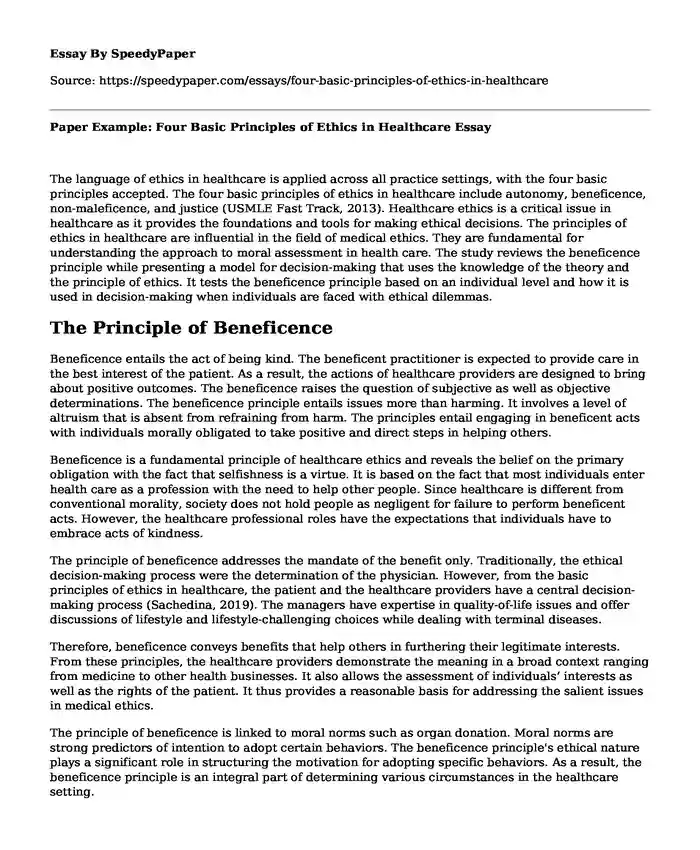
| Essay type: | Evaluation essays |
| Categories: | Medicine Ethics Healthcare |
| Pages: | 4 |
| Wordcount: | 862 words |
The language of ethics in healthcare is applied across all practice settings, with the four basic principles accepted. The four basic principles of ethics in healthcare include autonomy, beneficence, non-maleficence, and justice (USMLE Fast Track, 2013). Healthcare ethics is a critical issue in healthcare as it provides the foundations and tools for making ethical decisions. The principles of ethics in healthcare are influential in the field of medical ethics. They are fundamental for understanding the approach to moral assessment in health care. The study reviews the beneficence principle while presenting a model for decision-making that uses the knowledge of the theory and the principle of ethics. It tests the beneficence principle based on an individual level and how it is used in decision-making when individuals are faced with ethical dilemmas.
The Principle of Beneficence
Beneficence entails the act of being kind. The beneficent practitioner is expected to provide care in the best interest of the patient. As a result, the actions of healthcare providers are designed to bring about positive outcomes. The beneficence raises the question of subjective as well as objective determinations. The beneficence principle entails issues more than harming. It involves a level of altruism that is absent from refraining from harm. The principles entail engaging in beneficent acts with individuals morally obligated to take positive and direct steps in helping others.
Beneficence is a fundamental principle of healthcare ethics and reveals the belief on the primary obligation with the fact that selfishness is a virtue. It is based on the fact that most individuals enter health care as a profession with the need to help other people. Since healthcare is different from conventional morality, society does not hold people as negligent for failure to perform beneficent acts. However, the healthcare professional roles have the expectations that individuals have to embrace acts of kindness.
The principle of beneficence addresses the mandate of the benefit only. Traditionally, the ethical decision-making process were the determination of the physician. However, from the basic principles of ethics in healthcare, the patient and the healthcare providers have a central decision-making process (Sachedina, 2019). The managers have expertise in quality-of-life issues and offer discussions of lifestyle and lifestyle-challenging choices while dealing with terminal diseases.
Therefore, beneficence conveys benefits that help others in furthering their legitimate interests. From these principles, the healthcare providers demonstrate the meaning in a broad context ranging from medicine to other health businesses. It also allows the assessment of individuals’ interests as well as the rights of the patient. It thus provides a reasonable basis for addressing the salient issues in medical ethics.
The principle of beneficence is linked to moral norms such as organ donation. Moral norms are strong predictors of intention to adopt certain behaviors. The beneficence principle's ethical nature plays a significant role in structuring the motivation for adopting specific behaviors. As a result, the beneficence principle is an integral part of determining various circumstances in the healthcare setting.
According to the beneficence principle, all healthcare providers should strive to improve patients' health while doing the best for the patient in any situation (Page, 2012). Since what is suitable for one patient might not be ideal for another patient, there is a need to consider each case individually while ensuring other values do not conflict with the beneficence principle.
People show their value through the ethical principle of beneficence as they use it directly in the process of making decisions. Although most individuals do not base their decisions in moral situations, the beneficence principles help them respond to various situational information. It impacts individuals' behaviors with the full understanding of the healthcare providers in medical decisions (Page, 2012). The healthcare setting has integrated the decision-making process with the beneficence principle in defining the decision-making process. It entails work that complements, inform, and tests the normative claims of the beneficence principle.
Conclusion
The principles of health care ethics including the beneficence principle is a complete element necessary for deciding on the health care setting. Beneficence is a primary principle of healthcare and allows an understanding of the various healthcare policies. Through this principle, the individual uses reason to pick from the common morality while considering the judgment to apply to the issues at hand. The use of the beneficence principle is a fundamental approach for dealing with several ethical issues, especially to reach a reasonable decision. Ethics in the healthcare setting is a complex field. As a result, health care providers are required to develop an ethical theory that will help them satisfactorily handle various issues. The beneficence principle's significant role is the way it helps in handling ethical issues with the use of reflective equilibrium. Making a decision is essential, and beneficence principles lead to a change with the hope that improves individuals’ lives while increasing in the good.
References
Page, K. (2012). The four principles: Can they be measured, and do they predict ethical decision-making? BMC Medical Ethics, 13(1), 124-127.
Sachedina, A. (2019). Principles of Healthcare Ethics. Islamic Biomedical Ethics Principles and Application, 3(1), 25-76.
USMLE Fast Track. (2013, May 24). Core Ethical Principles - Patient Autonomy, Beneficence, Nonmaleficence & Justice. YouTube. https://www.youtube.com/watch?v=xTaT5yF_vPE
Cite this page
Paper Example: Four Basic Principles of Ethics in Healthcare. (2023, Nov 19). Retrieved from https://speedypaper.net/essays/four-basic-principles-of-ethics-in-healthcare
Request Removal
If you are the original author of this essay and no longer wish to have it published on the SpeedyPaper website, please click below to request its removal:
Popular categories




